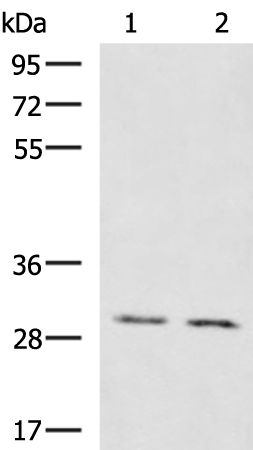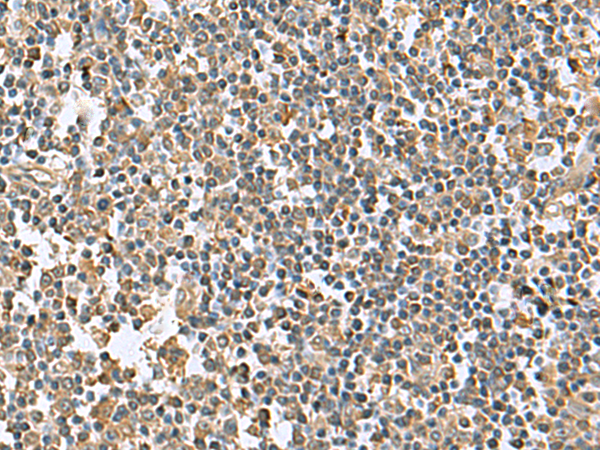

| WB | 咨询技术 | Human,Mouse,Rat |
| IF | 咨询技术 | Human,Mouse,Rat |
| IHC | 1/100-1/300 | Human,Mouse,Rat |
| ICC | 技术咨询 | Human,Mouse,Rat |
| FCM | 咨询技术 | Human,Mouse,Rat |
| Elisa | 1/5000-1/10000 | Human,Mouse,Rat |
| Aliases | CHBP2 |
| WB Predicted band size | 31 kDa |
| Host/Isotype | Rabbit IgG |
| Antibody Type | Primary antibody |
| Storage | Store at 4°C short term. Aliquot and store at -20°C long term. Avoid freeze/thaw cycles. |
| Species Reactivity | Human, Mouse |
| Immunogen | Fusion protein of human KRCC1 |
| Formulation | Purified antibody in PBS with 0.05% sodium azide and 50% glycerol. |
+ +
以下是3篇与KRCC1(KIAA0164/KIAA0164B)抗体相关的文献摘要信息:
---
1. **文献名称**:*KRCC1 interacts with CUL3 and regulates p53 ubiquitination under DNA damage*
**作者**:Li Y. et al.
**摘要**:该研究首次报道KRCC1蛋白通过与CUL3结合,参与调控DNA损伤条件下p53的泛素化降解过程。实验中使用KRCC1抗体进行免疫共沉淀(Co-IP),验证了KRCC1与CUL3复合物的相互作用,并发现其影响细胞周期调控。
---
2. **文献名称**:*Characterization of KRCC1 as a novel transcriptional repressor in chromatin remodeling*
**作者**:Wang X. et al.
**摘要**:研究通过KRCC1抗体的染色质免疫沉淀测序(ChIP-seq)技术,发现KRCC1在基因启动子区域富集,并通过招募HDAC1抑制靶基因转录,提示其在表观遗传调控中的关键作用。
---
3. **文献名称**:*KRCC1 antibody validation for immunohistochemistry in human tumor tissues*
**作者**:Tanaka R. et al.
**摘要**:研究系统验证了KRCC1抗体在多种肿瘤组织中的免疫组化(IHC)特异性,发现KRCC1在结直肠癌中高表达且与患者预后相关,为临床病理诊断提供了潜在生物标志物。
---
注:KRCC1相关研究较为有限,若需更多文献建议扩展关键词(如“KIAA0164”或结合其功能“染色体浓缩复合体”)。
**Background of KRCC1 Antibody**
KRCC1 (Lysine-Rich Coiled-Coil 1) is a protein encoded by the *KRCC1* gene, which is conserved across eukaryotes and characterized by its lysine-rich domain and coiled-coil structural motifs. These features suggest roles in protein-protein interactions and subcellular organization. KRCC1 is implicated in diverse cellular processes, including RNA metabolism, chromatin remodeling, and cell cycle regulation. Studies link it to the maintenance of genomic stability, potentially through interactions with components of the DNA damage response pathway or RNA-processing machinery.
The KRCC1 antibody is a valuable tool for detecting and analyzing KRCC1 expression and localization in various experimental models. It is commonly used in techniques like Western blotting, immunofluorescence, and immunoprecipitation to study KRCC1's distribution (nuclear/cytoplasmic), expression levels under different conditions (e.g., stress, cell cycle phases), and its association with molecular complexes. Researchers have employed this antibody to explore KRCC1's functional relevance in diseases such as cancer, where dysregulation of genomic stability pathways is common. Validation of the antibody typically includes knockout controls or siRNA-based depletion to confirm specificity. Understanding KRCC1's roles through antibody-based assays contributes to insights into its biological significance and potential therapeutic targets.
×